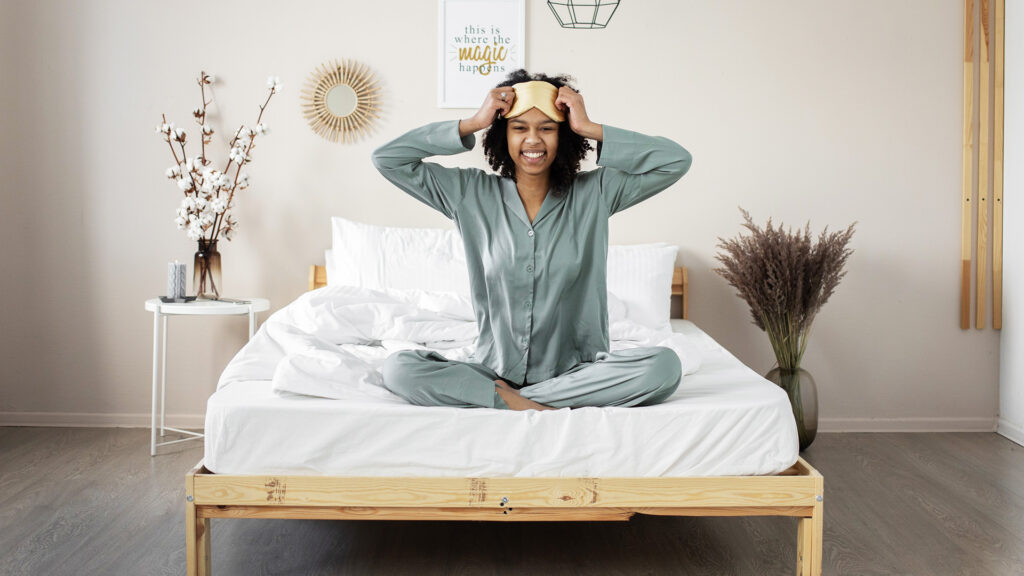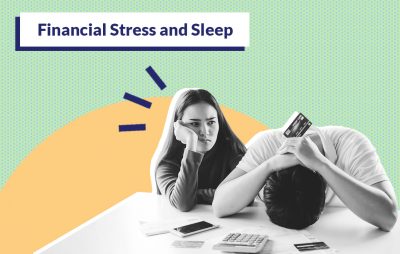Table of Contents

The American Academy of Sleep Medicine estimates that 87 percent of Americans have lost sleep worrying about money and finances. And according to the latest survey conducted by U.S. News & World Report, 41 percent of people are losing sleep over inflation, and 22 percent worry about climate change.
Now, there’s not much you can do about inflation, but there are ways to keep your stress over your worries in check. We won’t keep you in suspense: Your nightly snooze can do a lot to help keep your stress in check. Read on to learn how sleep reduces stress.
Note: The content on Sleepopolis is meant to be informative in nature, but it shouldn’t be taken as medical advice, and it shouldn’t take the place of medical advice and supervision from a trained professional. If you feel you may be suffering from any sleep disorder or medical condition, please see your healthcare provider immediately.
Long Story Short
- Stress can impact sleep by driving up cortisol levels and heightening anxiety
- Sleep reduces stress by lowering cortisol levels and decreasing anxiety
- Exercising and maintaining good sleep hygiene are excellent ways to keep stress in check and help your sleep.
What Keeps Us Awake at Night?
Worries and stress go hand in hand, and the problem with that is the domino effect that’s triggered as a result. If your worries are the first domino, stress is the second, and sleep is often the third. The remaining dominos are usually the whole host of health issues that follow when your sleep suffers.
“Stress can impact sleep in several ways,” says Laura DeCesaris, a functional medicine doctor and concierge health and wellness coach. “If you’re feeling stressed, it can impact how easily you fall asleep as well as your ability to stay asleep. Over time, this can become a vicious cycle — losing sleep further triggers your body’s stress response system, leading to elevated cortisol and a higher likelihood of sleep disturbances moving forward.”
The science behind how stress affects our sleep goes something like this. Under normal circumstances, cortisol levels taper off in the evening and peak just after we wake. When we’re dealing with stress, however, cortisol levels rise. Also known as the fight or flight hormone, cortisol keeps us alert, awake, and vigilant, even if it’s bedtime. One eye-opening study showed that stress led to a jaw-dropping nine-fold increase in cortisol levels. Sure, this is great if you’re sleeping in a tent in the Serengeti, but probably not so good if you’re sleeping in your bed on a random Tuesday night.
Moreover, DeCesaris adds, “Chronic stress can cause disruptions of the sleep-wake cycle, interrupting our natural circadian rhythm. Since this is what helps us fall asleep, stay asleep, and wake up energized, ongoing stress can really have wide-ranging impacts on how we feel day in and day out.”
And finally, DeCesaris notes that sleep is not only impacted by mental or emotional stress — physical stress can also impair your sleep. “Anything the body senses as ‘stress’ can impact sleep,” she says. “Alcohol, overtraining (or not recovering well from intense exercise), late-night eating, an inflammatory diet, and environmental toxins like mold are all stressors that may negatively impact sleep.”
Symptoms of Lack of Sleep and Stress
We’ve all experienced a restless night worrying about one thing or the other, and that is completely normal — we are human, after all. But if your everyday worries are stressing you out night after night, you might have other issues you want to address.
Over the short term, your stress can disrupt your sleep. And when that happens, you’ll likely deal with:
- Excessive daytime sleepiness
- Moodiness and irritability
- Impaired immunity
- Fatigue
- Impaired memory
Over time, losing sleep as a result of stress can lead to:
- Increased risk or worsening anxiety, depression, or mental illness
- Higher risk for stroke
- Diabetes
- High blood pressure
- Heart disease
- Hallucinations
- Severe mood swings
- Increased risk of car accidents
- Hallucinations
- Severe mood swings
How Sleep Reduces Stress
Professor Matthew Walker of the University of California once said, “Without sleep, it’s almost as if the brain is too heavy on the emotional accelerator pedal, without enough brake.” So while stress is busy driving up our cortisol levels and anxiety, sleep acts as a mediator of sorts, decreasing and bringing both back in line.
Sleep Decreases Cortisol Levels
Our bodies use the time we spend sleeping to perform chemical and biological processes that rebalance our bodies. DeCesaris adds that included among those processes is a reduction in stress hormones. Specifically, she notes that our body naturally reduces cortisol levels, as well as other stress-related hormones like adrenaline, while we sleep.
Sleep Regulates Our Immune System
If you’re ever lying awake at night a few days before a big event worrying about the cashier that sneezed on your credit card or the toddler who coughed in your direction at the park, you might be doing something counterproductive. Study after study has shown that sleep regulates our immune system. More specifically, sleep deprivation can have a deleterious effect on our immune systems, and good quality sleep can boost our immune response when we fall sick.
Sleep Keeps Anxiety in Check
In 2019, researchers out of UC Berkeley, California, published a study that identified an essential function of sleep — decreasing anxiety. Regarding the findings, the study’s lead researcher Professor Matthew Walker said, “Deep sleep seems to be a natural anxiolytic (anxiety inhibitor) so long as we get it each and every night.”
How To Get Better Sleep — Even When You’re Stressed
DeCesaris tells us that sleep doesn’t necessarily have to be lost, even in the most stressful times. There are things you can do to shore up your shut-eye, like:
- Incorporating some deep breathing or gentle stretching to unwind your body.
- Dimming the lights in your home and bedroom (come bedtime, make sure your room is as dark as possible for the best quality sleep).
- Doing a “brain dump” journal exercise in the evening, where you get all of the thoughts, to-do’s, etc., out of your head and onto paper so you’re not lying awake trying to remember everything.
- Eating your last meal 2-3 hours before bed. This gives your digestion time to do its thing and not keep you up when it’s time to go to sleep.
- Ditching alcohol and sugar — at least close to bedtime — as both contribute to inflammation, elevated cortisol, and a higher likelihood of poor sleep.
- Paying close attention to all aspects of your sleep hygiene, like maintaining consistent sleep and wake times, lowering the temperature in your room, dimming the lights in the evening, and throttling your screen time before bed.
Other Ways To Reduce Stress
Stress reduction looks different for everyone. Whether you lean into exercise or soothing relaxation for worry reduction, here are a few ideas to help you get your stress under control.
- Go for a walk
- Engage in some daily exercise
- Laughter is always good medicine, so try watching reruns of your favorite comedies
- Listen to some soothing music
- Do something you love (read a book, bake a cake, knit a scarf)
- Take up a hobby, like gardening, woodworking, or pottery
- Play with your pet
- Practice your downward dog (aka try some yoga)
- Phone a friend
The Last Word From Sleepopolis
From boosting cortisol levels, ramping up anxiety, and meddling with your sleep cycles, stress can have a pretty profound impact on your sleep. On the flip side, sleep reduces stress by reducing cortisol levels and keeping your immune system and anxiety in check. While it may be hard to catch your forty winks when worries abound, you can try some deep breathing exercises, physical activity, or journaling to clear your mind and manage your stress.
FAQs
How does sleep help you emotionally?
“Anyone who’s had a few nights of poor sleep can understand that a lack of sleep makes it more difficult to handle stress, regulate emotions, and feel your best,” says DeCesaris. “Quality sleep not only improves cognitive function and brain adaptive processing but also improves our ability to regulate our emotions and maintain a sense of well-being in our lives.”
Can you sleep stress away?
You can’t exactly sleep your stress away, but getting enough Zzzs will certainly help — one study out of UC Berkeley determined sleep can help decrease anxiety.
How do I sleep when I’m stressed or anxious?
If you’re feeling stressed or anxious, be sure to get plenty of exercise and eat well. Most of all, do your best to keep your sleep hygiene in check and on track — stick to consistent sleep and wake times, keep your room cool and dark, and put away your devices at least 30 to 60 minutes before bed.
Sources
1. Financial, health-related worries keeping Americans up at night. American Academy of Sleep Medicine – Association for Sleep Clinicians and Researchers. December 8, 2022. Accessed May 18, 2024. https://aasm.org/financial-and-health-related-worries-keeping-americans-up-at-night-survey-shows.
2. 2022 U.S. sleep habits survey | U.S. News – U.S. News & World Report. Accessed May 18, 2024. https://www.usnews.com/360-reviews/sleep/americans-sleep-quality-habits-survey.
3. Henry M, Thomas KG, Ross IL. Sleep, cognition and cortisol in Addison’s disease: A mechanistic relationship. Frontiers in Endocrinology. 2021;12. doi:10.3389/fendo.2021.694046
4. Çay M. The effect of cortisol level increasing due to stress in healthy young individuals on dynamic and static balance scores. Northern Clinics of Istanbul. Published online 2017. doi:10.14744/nci.2017.42103
5. Lo Martire V, Caruso D, Palagini L, Zoccoli G, Bastianini S. Stress & sleep: A relationship lasting a lifetime. Neuroscience & Biobehavioral Reviews. 2020;117:65-77. doi:10.1016/j.neubiorev.2019.08.024
6. Medic G, Wille M, Hemels M. Short- and long-term health consequences of sleep disruption. Nature and Science of Sleep. 2017;Volume 9:151-161. doi:10.2147/nss.s134864
7. Ktori S. Overstressed and underslept? study shows how deep sleep can reset anxious brain. GEN. November 5, 2019. Accessed May 18, 2024. https://www.genengnews.com/news/overstressed-and-underslept-study-shows-how-deep-sleep-can-reset-anxious-brain/.
8. Nollet M, Wisden W, Franks NP. Sleep deprivation and stress: A reciprocal relationship. Interface Focus. 2020;10(3):20190092. doi:10.1098/rsfs.2019.0092
9. Asif N, Iqbal R, Nazir CF. Human immune system during sleep. Am J Clin Exp Immunol. 2017;6(6):92-96. Published 2017 Dec 20.
10. Garbarino S, Lanteri P, Bragazzi NL, Magnavita N, Scoditti E. Role of sleep deprivation in immune-related disease risk and outcomes. Communications Biology. 2021;4(1). doi:10.1038/s42003-021-02825-4
11. Ben Simon E, Rossi A, Harvey AG, Walker MP. Overanxious and underslept. Nature Human Behaviour. 2019;4(1):100-110. doi:10.1038/s41562-019-0754-8
12. Yasmin Anwar MRN 4, Anwar Y. Stressed to the Max? deep sleep can rewire the anxious brain. Berkeley News. November 5, 2019. Accessed May 18, 2024. https://news.berkeley.edu/2019/11/04/deep-sleep-can-rewire-the-anxious-brain/.
13. Godman H. Top ways to reduce daily stress. Harvard Health. March 1, 2022. Accessed May 18, 2024. https://www.health.harvard.edu/staying-healthy/top-ways-to-reduce-daily-stress.
Subscribe Today!
Get the latest deals, discounts, reviews, and giveaways!



